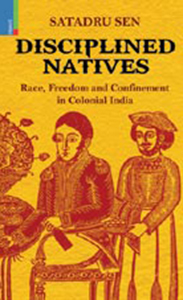
Disciplined Natives: Race, Freedom and Confinement in Colonial India
AUTHOR- Satadru Sen
| HB ₹995 . $69.95 . ₤46.95 |
||
INFORMATION
- AUTHOR : Satadru Sen
- ISBN : 978-93-80607-31-3
- Year : 2012
- Extent : viii + 360 pp.
- Discount available on checkout
- Usually dispatched within 3 to 5 working days.
Disciplined Natives
| HB ₹ 995 . $ . ₤ |
PB ₹ . $ . ₤ |
|
| POD ₹ . $ . ₤ |
e-Book ₹ . $ . ₤ |
INFORMATION
- AUTHOR – Satadru Sen
- ISBN – 978-93-80607-31-3
- Year – 2012
- Extent: 400 + 40 coloured illustrations
- 10% discount + free shipping
- Usually dispatched within 3 to 5 working days.
This volume examines three interrelated aspects of the history of British India: race, the disciplining institution, and attempts by the colonized to imagine states of freedom. They deal with sites as diverse as the prison, the family, the classroom, the playing field and children’s literature.
The included essays confront the ideological, social and political ramifications of the fact that even as metropolitan prisons and schools shifted their attention from the body of the inmate to the confined ‘soul’, colonial disciplinary institutions ensured that race was firmly attached to the body and its habits. Situated within the work on gender, domesticity and the state, they also engage the historiography that has sought to underline the challenges of reconciling Michel Foucault and Edward Said, i.e. studying the making of norms in a world of deviance and difference. They ask whether the liberating possibilities of the racialized-and-embodied ‘native’ self were confined to inversions and rearrangements of given normative hierarchies, or if we can occasionally glimpse radical departures and alternative configurations of power.
The Author
Satadru Sen is Associate Professor of South Asian history at the City University of New York.
This volume examines three interrelated aspects of the history of British India: race, the disciplining institution, and attempts by the colonized to imagine states of freedom. They deal with sites as diverse as the prison, the family, the classroom, the playing field and children’s literature.
The included essays confront the ideological, social and political ramifications of the fact that even as metropolitan prisons and schools shifted their attention from the body of the inmate to the confined ‘soul’, colonial disciplinary institutions ensured that race was firmly attached to the body and its habits. Situated within the work on gender, domesticity and the state, they also engage the historiography that has sought to underline the challenges of reconciling Michel Foucault and Edward Said, i.e. studying the making of norms in a world of deviance and difference. They ask whether the liberating possibilities of the racialized-and-embodied ‘native’ self were confined to inversions and rearrangements of given normative hierarchies, or if we can occasionally glimpse radical departures and alternative configurations of power.
The Author
Satadru Sen is Associate Professor of South Asian history at the City University of New York.
Table of Contents
| Introduction: Race, Freedom AndConfinement | 1-12 |
| 1. Anarchies Of Youth: The Oaten Affair And Colonial Bengal | 13-41 |
| 2. A Juvenile Periphery: Childhood AndLiterature In Colonial Bengal | 42-68 |
| 3. Chameleon Games: Ranjitsinhji’s Politics Of Race And Gender | 69-106 |
| 4. The Politics Of Deracination: Empire, Education And Elite Children | 107-131 |
| 5. The Orphaned Colony: Orphanage, Child And Authority In British India | 132-159 |
| 6. A Separate Punishment: Juvenile Offenders In Colonial India | 160-188 |
| 7. The Savage Family: Colonialism And Female Infanticide In Nineteenth-Century India | 189-216 |
| 8. The Female Jails OfColonial India | 217-242 |
| 9. Rationing Sex: Female Convicts In The Andaman Islands | 243-273 |
| 10. On The Beach In The Andaman Islands: Post-Mortem Of A Failed Colony | 274-298 |
| 11. Lost Between Africa And Tasmania: Racializing The Andamanese | 299-326 |
| 12. Savagery, Aboriginality And The Modern State | 327-349 |
| Index | 351-359 |





